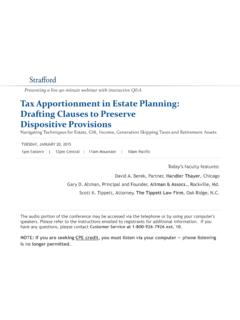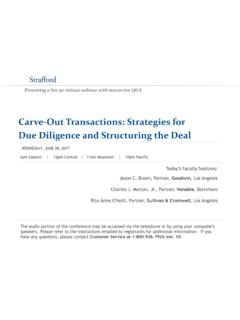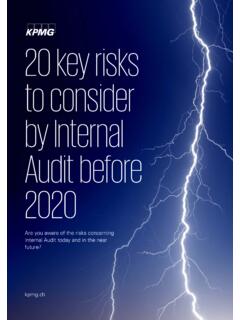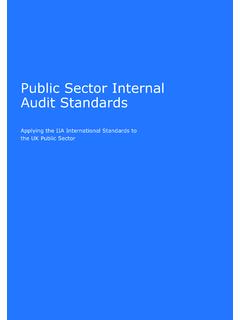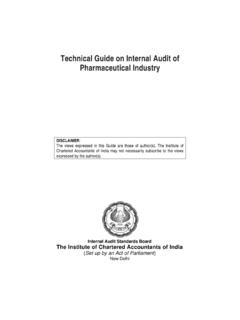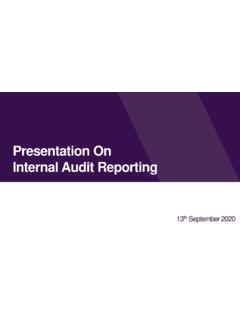Transcription of Audit Response Letters and Disclosures: In-House Counsel's ...
1 The audio portion of the conference may be accessed via the telephone or by using your computer's speakers. Please refer to the instructions emailed to registrants for additional information. If you have any questions, please contact Customer Service at 1-800-926-7926 ext. 10. Presenting a live 90-minute webinar with interactive Q&A Audit Response Letters and Disclosures: In-House Counsel's Role in Balancing Auditor Demands and Company Privileges Navigating the Scope of Lawyers' Responsibility to Auditors Under the ABA Treaty When Responding to Information Requests Today s faculty features: 1pm Eastern | 12pm Central | 11am Mountain | 10am Pacific THURSDAY, MARCH 30, 2017 Stanley Keller, Of Counsel, Locke Lord, Boston Brian E. Kowalski, Partner, Latham & Watkins, Washington, Maryann A. Waryjas, Senior Vice President, Chief Legal Officer and Secretary, Herc Rentals, Bonita Springs, Fla. Alan J. Wilson, Esq., Wilmer Cutler Pickering Hale and Dorr, Washington, ActiveUS In-Hous e Counsel: Cons iderations for Inte racting with Auditors Tho mas W.
2 White Alan J. Wils on March 2017 ActiveUS TABLE OF CONTENTS P age Introduct I. Basic Principles Underlying Lawyer-Auditor I nteraction ..2 a. Account ing Standard Governing Cont ingenc ies ..2 b. Conf ident ia lit y and P rivilege Cons iderat II. Audit ors Interaction w it h Attor neys in the Audit P a. Statement on Audit ing Standards 12 (AS 2505 (AU 337)/AU-C 337)..6 b. ABA Statement of Polic y ..9 c. Government Invest igat ions .. 11 d. Management Representat ions (AS 2805 (AU 333)/AU-C 580) .. 12 III. Audit ors Obligat ion Regarding Fraud and I llega l 13 a. Detecting and Responding t o Fraud .. 13 b. Invest igat ions of I lle gal Acts .. 15 c. SEC Rule 13b2-2 .. 18 Appe ndix A ..A-1 Sample Audit Inquir y Letter from CFO t o Genera l Counse l ..A-1 Sample General Counsel Audit Response Letter ..A-2 Act iveUS In-Hous e Counsel: Cons iderations for Inte racting with Auditors Thomas W. White* A la n J . Wils on Introduction This outline discusses the principal accounting, auditing and legal standards and requirements that undergird the relationship between a company s independent external auditor and its legal counsel, particularly the company s In-House counsel.
3 The professional responsibilit ies of the two professions differ. The auditor is engaged to provide an independent, objective opinion, based on the performance of specified procedures, about the fairness of the entity s financial statements. In order to perform that function, the auditor is required to obtain evidential support for the company s assertions, including with respect to accounting for potential legal claims against the company. The lawyer, on the other hand, is required to act as the company s zealous advocate; for the lawyer to effectively represent the client and protect its interests, professional standards impose a duty of confidentialit y, and the law protects the lawyer s communications with his or her client and the lawyer s work product from disclosure. In the case of litigation, claims and assessments, the respective interests of independent auditors and lawyers have traditionally been balanced by the longstanding Treaty between the two professions.
4 Still, there has been an increased focus in recent years on accounting for and disclosure of loss contingences by the Securities and Exchange Commission ( SEC ), accounting standard setters, and others. In many cases, that has led to expanded requests from auditors for information about loss contingencies and other legal matters, particularly with respect to large, bet the company lawsuits and major government investigations. In-House lawyers, in particular, often find themselves on the front lines in responding to these requests on behalf of their companies. They must responsibly address the auditor s needs for information while protecting their corporate client s le gitima te inte r e s ts in safeguarding privileged communications and avoiding prejudice to the entity s litigation position. The outline first discusses the basic accounting and legal privilege principles that come into play in many dealings between the independent auditor and the company s counsel.
5 It then describes the auditing standards that define the auditor s procedures with respect to litigation contingencies and the ABA Statement of P olicy that governs the lawyer s Response . Finally, the outline addresses the auditor s responsibilit ies with respect to fraud and illegal acts, which, when they come into play, can lead to particularly s e ns itive interactions between the auditor and the In-House lawyer. * Partner, Wilmer Cutler Pickering Hale and Dorr LLP, Washington, DC. Associate, Wilmer Cutler Pickering Hale and Dorr LLP, Washington, DC. 2 ActiveUS I. B as ic Principle s Unde rlying Lawye r-Auditor Inte raction a. Accounting Standard Gove rning Continge ncie s 1. The auditor s need for information regarding legal matters derives in the first instance from the requirements of generally accepted accounting pr inc iple s ( GAAP ) with respect to loss contingencies.
6 The accounting standard, which has been in effect since 1975, is now codified in Accounting Standards Codification ( ASC ) 450-20 (formerly Statement of Financial Accounting Standards No. 5). 2. ASC 450-20 prescribes the accounting treatment for contingencies, including requirements for accruing for and/or disclosing loss contingencies1 arising from litigation, claims, and assessments. The general structure of ASC 450-20 is as follows: A. Asserted Claims. A company must accrue for a loss contingency if both of the following conditions are met: (i) Information available before the financial statements are issued or are available to be issued .. indic a te s tha t it is probable2 that an asset had been impa ir ed or a liability had been incurred at the date of the financial statements a nd ( ii) The amount of loss can be reasonably estimated. ASC 450-20-25-2. If the reasonable estimate of loss is a range, then if some amount within a range of loss appears at the time to be a better estimate than any other amount within the range, that amount shall be accrued.
7 When no amount within the range is a better estimate than any other amount, however, the minimum amount in the range shall be accrued. ASC 450-20-30-1. B. Among the factors that should be considered in assessing the probabilit y of an unfavorable outcome are the following: i. The nature of the litigation, claim, or assessment ii. The progress of the case (including progress after the date of the financial statements but before those statements are issued or are available to be issued) iii. The opinions or views of legal counsel and other advisers, although, the fact that legal counsel is unable to express an opinion that the outcome will be favorable to the entity should not necessarily be interpreted to mean that the condition [for accrual] is me t 1 Loss Contingency An existing condition, situation, or set of circumstances involving uncertainty as to possible loss to an entity that will ultimately be resolved when one or more future events occur or fail to occur.
8 The term loss is used for convenience to include many charges against income that are commonly referred to as expenses and others that are commonly referred to as losses. A SC 450-20-20. 2 Probable The future event or events are likely to occur. A SC 450-20-20. 3 ActiveUS iv. The experience of the entity in similar cases v. The experience of other entities v i. Any decision of the entity s management as to how the entity intends to respond to the lawsuit, c la im, or assessment (for example, a decision to contest the case vigorously or a decision to seek an out-of-court settlement). ASC 450-20-55-12. C. If either one of the aforementioned conditions of ASC 450-20-25-2 is unmet, ASC 450-20 requires disclosure with respect to the loss contingency if it is reasonably possible3 that a loss or an additional loss (above the amount accrued) may have been incurred. ASC 450-20-50-2, -3. That disclosure must include an estimate of the loss or additiona l los s , if the los s is e s tima ble.
9 ASC 450-20-50-4. No disclosure is required if the possibilit y of a loss is re mo D. Unasserted Claims. No disclosure is required of a loss contingency involving an unasserted claim or assessment if there has been no manifestation by a potential claimant of a possible claim or assessment unless (i) it is considered probable that a claim will be asserted and (ii) there is a reasonable possibility that the outcome will be unfavorable. ASC E. Recent proceedings involving ASC 450-20: i. In Indiana Public Retirement System v. SAIC, Inc., 818 85, 93 (2d Cir. 2016), the court held that under ASC 450-20-50-6, where there has been a manifestation by a potential claimant of an awareness of a possible claim, the threshold for disclosure of an unasserted claim was reasonably possible, not probable. In connection with a claim that SAIC failed to disclose a kickback scheme involving a New York City contract, the court held that the manifestation of awareness test was satisfied because the City of New York had publicly indicated its intent to consider claims against SAIC under the contract.
10 How the manifestation of awareness test will be applied in other situations remains to be seen. 3 Reasonably Possible The chance of the future event or events occurring is more than remote but less t h an likely . A SC 450-20-20. 4 Re mo t e The chance of the future event or events occurring is slight. A SC 450-20-20. 5 Another provision of ASC 450-20 dealing with unasserted claims does not contain the manifestation of awareness language. It provides: If the judgment is that assertion is not probable, no accrual or disclosure would be required. A SC 450-20-55-15. 4 ActiveUS ii. SEC v. RPM International Inc., Case 1:16-cv-01803 ( Sept. 9, 2016). The SEC alleges that RP M and its general counsel failed to timely disclose a loss contingency, or record an accrual for, a Department of Justice investigation that ultimately resulted in a $61 million settlement. According to the SEC, once the company and its GC became aware of a qui tam case and began exchanging information with the government about pos s ible lia bilit y a nd s e ttle me nt, it was probable and reasonably estimable that RPM would incur a materia l loss in connection with the DOJ investigation (ASC 450-20); therefore, disclosure and accrual was required.






